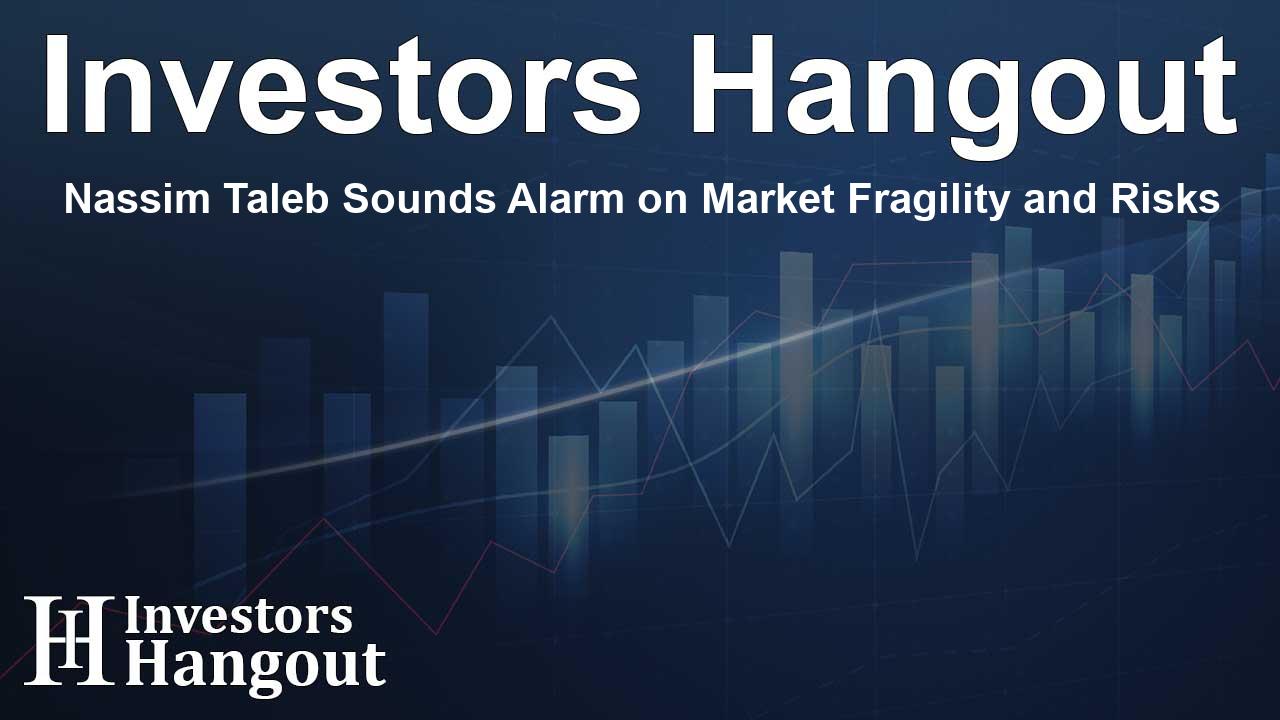Nassim Taleb Sounds Alarm on Market Fragility and Risks

Nassim Taleb Sounds Alarm on Market Fragility and Risks
Nassim Taleb, the influential author of "The Black Swan," shared his concerns regarding the current state of the financial markets, suggesting they are among the most fragile they have been in the past twenty years. In a recent interview, he pointed out that while the stock market has enjoyed a bullish phase over the last year, deeper issues could lead to a potential market collapse.
Current Investing Environment
Taleb's insights can be viewed as a cautionary tale for investors who might be overly optimistic in light of recent stock rallies. He emphasized that high debt levels and inflated stock prices are troublesome indicators, suggesting that preparation for an eventual downturn is crucial.
He noted that many investors are currently focused on enjoying positive market trends without adequately acknowledging the underlying vulnerabilities that could precipitate a market shake-up. With many sectors appearing to oscillate and a slew of risks pervading the market, he advocates adopting a more defensive approach.
Risks Highlighted by Taleb
In his discussions, Taleb elaborated on several risks that investors should keep in mind:
First, he remarked about the extreme concentration of market performance among a select group of companies, especially those closely linked to artificial intelligence advancements. This concentration raises questions about the sustainability of their growth.
Second, the overall debt levels within the economy are troubling. Taleb referred to the US economy's debt-to-GDP ratio, which had surpassed 124%. This alarming figure, if compounded with unexpected shocks, could create even more precarious conditions for the market.
Additionally, the current economic climate is characterized by uncertainty and confusion. Taleb pointed out the unclear trajectory of several sectors, which further complicates the investing landscape.
The Fragility of Current Markets
Taleb continues to argue that the conditions today parallel those preceding significant market crashes. As complacency creeps into investor behaviors, Taleb believes that having a hedging strategy in place is a wise approach. Many investors tend to believe that their current strategies are infallible, yet history shows that many crises arise from unanticipated events.
He warns that downturns often occur when no one expects them, suggesting that investors should remain vigilant and adaptable in their strategies. Thus, hedging against potential market collapses becomes an essential part of managing investment risk.
Understanding the Role of Globalization
Another facet of Taleb's argument deals with the interconnectedness of global markets. He pointed out that increased globalization has made economies more interdependent, which can result in the rapid spread of economic shocks across borders. Taleb highlighted that this interconnectedness can complicate investment decisions further, as what happens in one market can significantly affect another.
This risk of global contagion underlines the importance of diversifying not just within domestic markets, but also considering international factors when crafting investment strategies.
Investor Behavior and Market Adjustments
As market participants emerge from a prolonged period of low interest rates, behavioral changes have thickened the atmosphere of risk-taking among investors. Many are inclined towards higher-risk investments, having grown accustomed to bull market conditions. Taleb cautions that this risk-on mindset can lead to vulnerabilities, especially if market dynamics shift unexpectedly.
The reality is that while many investors have enjoyed sustained market growth, the specter of a downturn looms large. Taleb's insights urge investors to remain strategic and consider potential risks seriously as they navigate their investment journeys.
Frequently Asked Questions
Who is Nassim Taleb?
Nassim Taleb is a renowned essayist, scholar, statistician, and risk analyst, best known for his book "The Black Swan," which discusses the impact of rare, unpredictable events.
What are the main concerns raised by Taleb?
Taleb warns of high debt levels, concentrated stock market growth, and increased fragility in financial systems, advocating for investor caution and hedging strategies.
Why does Taleb think the market is fragile?
He believes the current market dynamics reflect conditions prior to historical crashes, emphasizing the combination of complacency among investors and underlying economic vulnerabilities.
What should investors do in light of Taleb's warnings?
Investors are encouraged to adopt a defensive strategy, considering hedges against potential market downturns and diversifying investments to mitigate risks.
How does globalization impact market risks according to Taleb?
Taleb asserts that increased globalization has made economies more interdependent, leading to a higher likelihood of foreign shocks affecting domestic markets.
About The Author
Contact Caleb Price privately here. Or send an email with ATTN: Caleb Price as the subject to contact@investorshangout.com.
About Investors Hangout
Investors Hangout is a leading online stock forum for financial discussion and learning, offering a wide range of free tools and resources. It draws in traders of all levels, who exchange market knowledge, investigate trading tactics, and keep an eye on industry developments in real time. Featuring financial articles, stock message boards, quotes, charts, company profiles, and live news updates. Through cooperative learning and a wealth of informational resources, it helps users from novices creating their first portfolios to experts honing their techniques. Join Investors Hangout today: https://investorshangout.com/
The content of this article is based on factual, publicly available information and does not represent legal, financial, or investment advice. Investors Hangout does not offer financial advice, and the author is not a licensed financial advisor. Consult a qualified advisor before making any financial or investment decisions based on this article. This article should not be considered advice to purchase, sell, or hold any securities or other investments. If any of the material provided here is inaccurate, please contact us for corrections.
